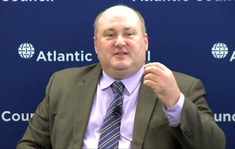-
Geoff Dabelko: Face Down the “Four Tyrannies” to Improve Cross-Sectoral Collaboration

What does Himalayan ice melt have to do with food security in Cambodia? A lot, when they both significantly affect the flow of the Mekong River. But when it comes to long-term planning across topical and regional lines, development agencies aren’t always as collaborative as they could be – both externally and internally.
What does Himalayan ice melt have to do with food security in Cambodia? A lot, when they both significantly affect the flow of the Mekong River. But when it comes to long-term planning across topical and regional lines, development agencies aren’t always as collaborative as they could be – both externally and internally.
Recalling a multi-day USAID workshop on the future of development at the Wilson Center, Ohio University’s Geoff Dabelko said there are four major barriers to this kind of connected thinking: “The tyranny of the inbox, the tyranny of immediate results, the tyranny of the single sector, and the tyranny of the uni-dimensional measurement of success.”
These barriers, a consequence of bureaucracy and accelerating demands on development practitioners, create incentives to work in topical and regional “silos” and produce results as soon as possible. They also result in poor communication between groups that could otherwise be collaborating, Dabelko says in this week’s podcast.
Speaking at the Atlantic Council for the launch of The Future Can’t Wait, which examines societal and technologic trends that might influence development over the next few decades, Dabelko said his chapter in the book began with a focus on the environment but ended up commenting more broadly. “If we do the long-term trends analysis…then how do you put [what we’ve learned] into play? And how well or how poorly are our institutions for doing development set-up to take account of those trends?” he asked. The answer at the moment: not very well.
A lot of organizations are constrained by funding that’s earmarked for single sectors, like biodiversity or climate change. But in an increasingly connected world, “the periphery” of these sectors – for example how they might overlap with global health or security concerns in another country – is critical, he said. “The challenge becomes, how do we systematically understand those connections?”
Dabelko spoke at the Atlantic Council on December 17 for the launch of The Future Can’t Wait.
Friday podcasts are also available for download on iTunes.
Topics: Asia, biodiversity, Cambodia, climate change, cooperation, development, environment, Friday Podcasts, global health, podcast, security, USAID
 A Publication of the Stimson Center.
A Publication of the Stimson Center.




